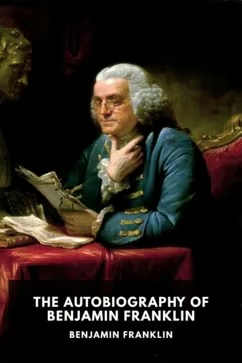
Notes on
The Autobiography of Benjamin Franklin
by Benjamin Franklin
• 4 min read
Actions Taken / Changes
- Read books
- Aim to be industrious
- Be frugal
- Create or join a group/community with which you regularly meet and learn from each other.
- Plan your day
- Aim to act virtuously, and be dilligent in this pursuit
Summary of Key Points
Benjamin Franklin
Franklin was fond of reading. In fact, later in his life, he created a public library.
He would use this himself to get books for studying, on which he spent 1-2 hours a day.
At one part in his life, he only allowed time for reading—besides his work.
He praises highly his ability to read & write throughout the book.
As far as I can tell, Franklin was an industrious & interesting man, even in youth. He was very much into reading, which made him a great conversation partner, and therefore was able to speak well with various people. He gained lifelong friends from this.
He was also seemingly active, and quite proficient at it. Particularly at swimming, which he was at one time asked to instruct younger men in (He declined, I believe).
Interesting, he kept mostly to water, not drinking much beer, as seems to have been customary back then.
Franklin also seems to have learned Italian, French, Spanish, and some Latin.
The Junto
Franklin founded a group for mutual improvement called Junto.
This is similar to what we, in modern times, would call a mastermind.
They would discuss and write of morals, politics, and natural philosophy.
For this, each member was required to create one or more query that would be discussed in the group. And each member should, each three months, be able to produce and read an essay of any topic of his choosing.
Industriousness & Frugality
Seest thou a man diligent in his calling, he shall stand before kings, he shall not stand before mean men
— Solomon
Franklin found that his habits and industriousness helped him.
One such habit was frugality. He also made sure to not be seen spending time on frivolous activities. And that people should see him engaged in work, even in public (e.g. transporting paper by wheelbarrow).
This highlight also includes a quote by Solomon. Basically, if you are diligent in your craft, you’ll turn out well.
This seems to be the case for Franklin.
Plan for Attaining Moral Perfection
Franklin made a plan for attaining moral perfection. He thought virtue something worth striving for, and he wanted to do so to the best of his ability.
For this, he wrote down 13 virtues and a short description of how they may be enacted.
He then set off to acquire the habits one at a time.
Franklin would follow the advice of Pythagoras and do a daily examination of how well he fared in acting virtuously.
On each page, he would put a virtue as the “title”, and it’s assigned passage under (the description). On these pages, he would make a table, columns being labeled by says, and rows by virtues. In this table, he would place a dot for each fault he found for the given virtue, after examining his day.
He would tackle one virtue at a time. The first week, he would aim for a “spotless” row for Temperance.
The next week, if he was successful in the previous, he would incorporate focus on the next virtue.
So in total, it would take 13 weeks to incorporate focus on each virtue, if all goes well.
He never did achieve the perfection he strived for. But he did become much happier for having made the effort towards it.
The Virtues
- Temperance—eat not to dullness; drink not to elevation.
- Silence—speak not but what may benefit others or yourself; avoid trifling conversation.
- Order—let all your things have their places; let each part of your business have its time.
- Resolution—resolve to perform what you ought; perform without fail what you resolve.
- Frugality—make no expense but to do good to others or yourself; i.e., waste nothing.
- Industry—lose no time; be always employed in something useful; cut off all unnecessary actions.
- Sincerity—use no hurtful deceit; think innocently and justly; and, if you speak, speak accordingly.
- Justice—wrong none by doing injuries, or omitting the benefits that are your duty.
- Moderation—avoid extremes; forbear resenting injuries so much as you think they deserve.
- Cleanliness—tolerate no uncleanliness in body, clothes, or habitation.
- Tranquillity—be not disturbed at trifles, or at accidents common or unavoidable.
- Chastity.
- Humility—imitate Jesus and Socrates.
Daily Planning
Franklin plans out his day, and has attached his daily schedule / planner here in the book.
He reflects on what he shall do in the morning, and again in the evening.
He asks: what good should I do today? And later: what good have I done today?
Liked these notes? Join the newsletter.
Get notified whenever I post new notes.